Medically review by Kim Langdon
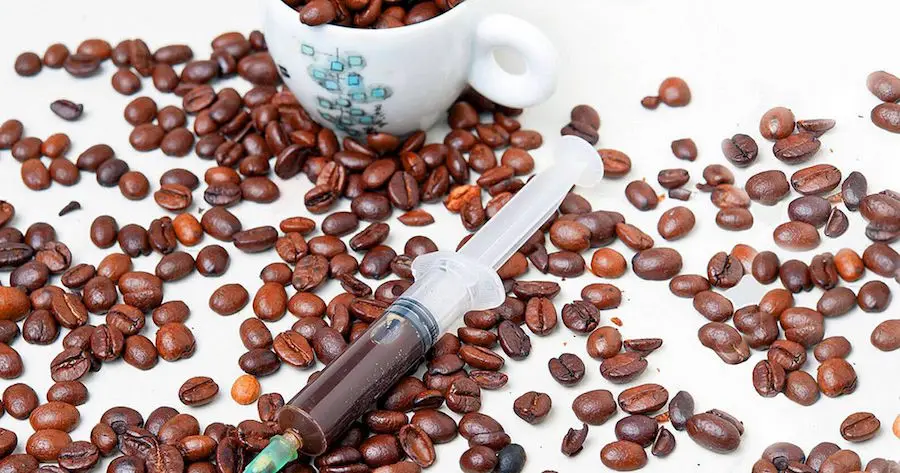
In the hustle and bustle of daily life, many people rely on caffeine to merely get through the day. When it comes down to it, caffeine is a drug, and it has the potential to be abused.
In an effort to attain and maintain optimal health, cutting out caffeine can be highly beneficial. While there are some benefits, there are many more downsides to excess caffeine consumption.
Then, of course, there is the caffeine detox. We'll talk about the caffeine withdrawal timeline so you know what you're getting yourself into.
Why cut out caffeine?
While there are some health benefits to caffeine, there are many more convincing reasons not to drink it.
Here are a few cons:
- Blood pressure spikes. If you’re watching your blood pressure, you should consider cutting back on caffeine. While a cup or two is probably not causing any trouble - even short-term spikes - more than 500 milligrams puts you at risk (which is roughly four cups of coffee).
- Increases anxiety. If you already suffer from mild anxiety symptoms, caffeine may be worsening them by causing that “fight or flight” reaction. If you don’t experience anxiety at all, coffee can bring on symptoms such as increased heart rate and, in the worst cases, panic or anxiety attacks.
- Heartburn and acid reflux. Coffee, in particular, has high acidity, so it can irritate symptoms of heartburn and acid reflux since it relaxes the lower oesophageal sphincter.
- Disrupts REM sleep. The negative effects of caffeine on sleep quality aren't just limited to falling asleep; it generally decreases the amount of REM sleep you'll get. This is that deep, restorative sleep you want to get. That's going to drive the vicious caffeine cycle because you'll naturally need it more the next day when you're feeling lethargic.
Here's the vicious cycle...
Caffeine puts your emotions in overdrive. It's like adrenaline, and to be in a state of constant adrenaline rush is pretty unpleasant.
Unsurprisingly, it's also awful for our sleeping patterns.
You see, overconsumption of caffeine = poor sleep = the need to consume excessive amounts of caffeine the next day.
Unless you break this cycle, it never ends.
How long does caffeine last?

Coffee has a half-life of 6 hours, which means it takes a full twenty-four hours to work its way out of your system.
This also means that if you have a cup of joe at eight a.m., then you’ll still have 25% of the caffeine in your body at eight p.m.
Or anything you drink with caffeine in it after noon will still be at 50% strength at bedtime.
Even if you feel as though you've built up a high tolerance to caffeine, you are still facing the effects of it whether or not they're obvious.
If you can't trace your insomnia back to anything else but you're still drinking caffeine most of the day, it could easily be the culprit.
Sources of Caffeine
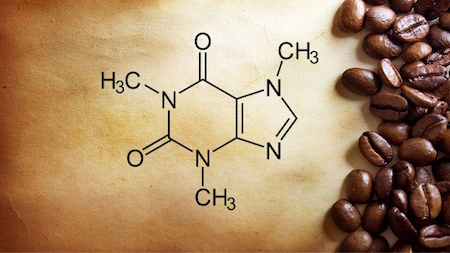
First, let's discuss what you're cutting out. Yes - even chocolate!
- Coffee. This is the obvious one, and probably the one you’re using most often. An average cup of coffee (8 oz.) contains 95 mg. of caffeine.
- Tea. Most tea varieties don’t contain as much caffeine as coffee, but black tea packs a punch. Unless a tea is of the herbal variety, it contains some caffeine. Other culprits include green, white, and oolong tea. Green tea has anywhere from 24-45 mg. of caffeine per cup, while black tea has around 14-70 mg. per cup. As you can see, the caffeine content differs wildly, so you may be overdoing it without even knowing it!
- Decaf coffee. Even the decaf stuff contains trace amounts of caffeine; so if you’re sensitive to it, a cup or two can still be impacting you. Some decaf cups contain up to 20mg of caffeine.
- Chocolate. Dark chocolate bars can contain the same amount of caffeine as a bottle of soda. While dark chocolate has other benefits, eating the whole bar might leave you feeling buzzed from both the caffeine and the sugar. One ounce of dark chocolate contains up to 12 mg. of caffeine, so if you're having trouble sticking to the serving size, you could be asking for a big buzz!
- Pain relievers. If you suffer from regular headaches or other aches and pains, you might reach for the Excedrin. While caffeine does often help to alleviate headaches, taking two or more pills can easily cap you off at as much caffeine as a cup of coffee. A dose of Excedrin contains a whopping 65 mg. of caffeine!
What to expect during caffeine withdrawal
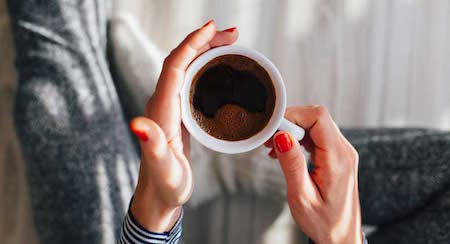
Weaning off the stuff isn't fun. Perhaps, you don't even have the chance, and you're going cold turkey. Personally, we recommend quitting in one fell swoop!
It's a bit like ripping off a Band-Aid. It's hard - there's no denying it.
Everyone reacts to withdrawal differently, and the time in which you experience symptoms will vary widely.
Some people who use caffeine daily might feel nothing at all, while someone who has just a small cuppa in the A.M. could feel it pretty heavily for a week.
Here is what you might expect:
- Headache
- Lethargy
- The inability to focus
- Sleepiness
- Depressed mood
- Constipation/digestive distress
- Flu-like symptoms
- Dizziness
- Insomnia
- Irritability
One thing is for sure: YOU GOT THIS. Another thing we can guarantee is that it's worth it.
If it weren't, we wouldn't ask you to do it! In terms of sleep, going without caffeine is important.
Caffeine withdrawal remedy
We have a few ideas to get you through the tough part!
- Drink plenty of water. Two liters of water (or eight 8 oz. glasses) is enough to keep you well-hydrated, but this is the bare minimum. If you're going through some serious caffeine withdrawal, we recommend adding another liter to the mix. There's no need to be overzealous, but some extra hydration is better than having too little water during this time.
- Supplement with adaptogens like red ginseng. This supplement has an energizing impact, so you might feel that boost in your mood and focus without relying heavily on your daily latte.
- It also helps to support the adrenals which are often drained over time by heavy caffeine intake. Follow directions for dosage based on the tincture or capsules you get.
- Use magnesium oil. Magnesium is something many people are deficient in, but it has amazing benefits. It is most commonly associated with improving sleep, but it can also improve caffeine withdrawal. Magnesium oil, in particular, is much more easily absorbed by the body via the skin compared to taking it in pill form. Considering withdrawal symptoms can often bring on irritability, stress, and restlessness, ensuring proper magnesium levels can reduce the severity or duration of them and help you get back into normalized sleeping patterns. It can also improve digestion which can suffer temporarily when cutting out coffee.
- Supplement with vitamin C to support the adrenals. The adrenals are vital in caffeine detox, as daily intake takes its toll on these glands and throws our hormones out of whack. 1,000 mg. of vitamin C per day is enough to get you on the fast track to healing. This vitamin is directly involved with cortisol production, and it has many other benefits including its immune-boosting properties.
- Use milk thistle to support the liver. Like any "drug" such as alcohol, caffeine can hit the liver hard! Milk thistle is a great supplement to restore your liver's health and ensure good liver functions, of which there are around 300!
- Get some sleep! Take a nap if you need to. Give yourself permission. Go lightly. Cut back on the workload if you need to. Be easy on yourself, and make a few excuses if you need to. This too shall pass, and you don't have to be 100% right now.
- Peppermint tea. This magical (and caffeine-free!) elixir can help remedy a headache. Peppermint tea is also rather tasty, and can help you replace the ritual of drinking coffee while soothing that pounding in your head from the lack thereof.
Read more about some of our favorite natural and calming sleep aids.
Coffee alternatives
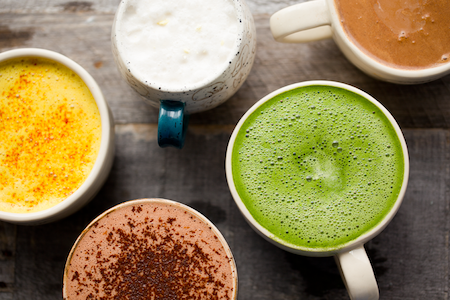
While caffeine may not seem to be an issue for you, it’s always worth eliminating it while trying to get your sleep on track.
Besides, there are endless ways to replace caffeine that can supply you with the same feeling of “ritual” and even offer a more natural energy boost.
Herbal tea. Often, the ritual of coffee is as important as the effects of caffeine itself. With herbal tea, you can indulge in a piping hot cup of comfort. The good part?
There are so many different varieties from rooibos to fruit-flavored teas to digestion-friendly ginger brews. Beyond taste, sipping on healthy herbs can have a myriad of positive side effects.
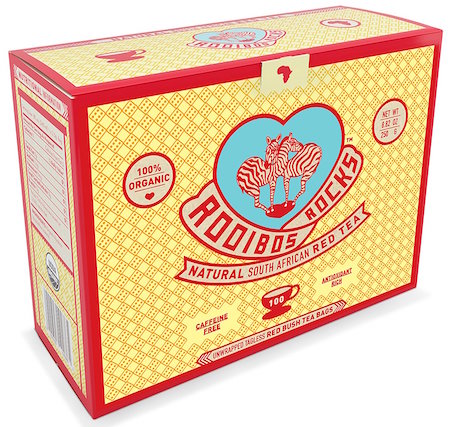
Rooibos is a fantastic herbal tea, and it's delicious to boot.
Dandelion. This “weed” has an impressive list of health benefits, and it can be dried and brewed into a tonic to replace coffee.
Dandelion can help your body’s natural immune response and support liver health.
It’s also a great source of antioxidants and can help to stimulate appetite and digestion, so it may be good for an upset stomach.
Bone broth. Rich in vitamins, minerals, collagen, and healthy fats and protein, bone broth is affordable and easy to make at home.
You can use bone broth in soups, stews, and curries, or sip on a cup in place of your morning coffee.
It's beneficial for your bones, joints, skin, and hair while acting as a natural detoxifier.
You can add spices like turmeric and garlic to up its anti-inflammatory properties, or bulletproof it with a spoon of healthy fats from coconut oil.

Making your own is easy, but you can also get it delivered right to your door for easy sipping.
Chicory root. Chicory increases the production of bile which helps digestion. The antioxidant compounds found in chicory can help to reduce redness, support the liver, and protect the body against harmful toxins and organisms. This earthy root can be brewed into a fantastic coffee substitute.
Teeccino. This is a brand of herbal coffee that comes in a huge variety of flavors, just like herbal tea. It has that earthy taste of a fine cup of coffee, so this might be the trick to getting off the stuff for good.
It’s also incredibly good for you. Its low acidity offers a substitute that’s suitable for those with heartburn or acid reflux.
It also contains inulin (a prebiotic needed to absorb probiotics), potassium, and soluble fibre.
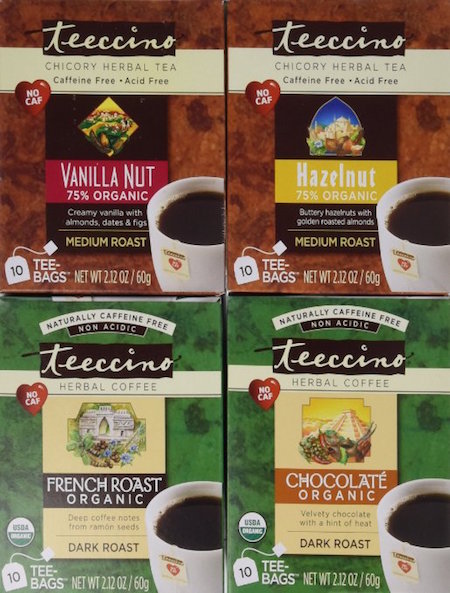
Try the variety pack to find YOUR preferred flavor.
Infused water. Try leaving some berries, citrus, and/or fresh herbs in your water bottle overnight for an infused treat. Not only will this help you feel energized throughout the day, it will keep you hydrated - of the opposite effect to coffee.
La Croix or sparkling water. If you’re headed out to the bar, ask for sparkling water and give it a splash of citrus. This isn’t only a healthy coffee alternative, but it’s a good alternative to alcohol or soda while eating out.
In the U.S., La Croix is sold in cans in many flavors with just two ingredients: bubbly water and natural flavors. If you’re trying to kick caffeine in the form of soda, this is your best bet.
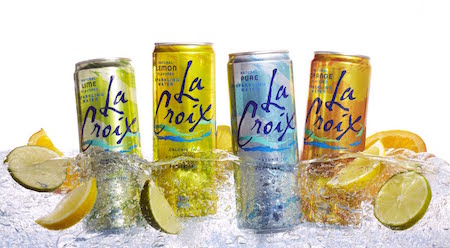
An easy way to kick your habit AND stay hydrated.
Kombucha. Kombucha might give you a natural boost with its healthy dose of good bacteria. Most kombucha is brewed with tea; the fermentation process mostly eliminates caffeine.
Through that process, iron is released which can help give you sustained energy. It also contains enzymes, B-vitamins, probiotics, and antioxidants. This tonic is powerful for optimal gut health.
Coconut water. Coconut water can help you replenish electrolytes after a tough workout. Some people may reach for a caffeine boost, but coffee will only dehydrate you further.
Coconut water comes from a whole foods source - the coconut - and it’s naturally high in B-vitamins and potassium which may offer you a little extra energy.
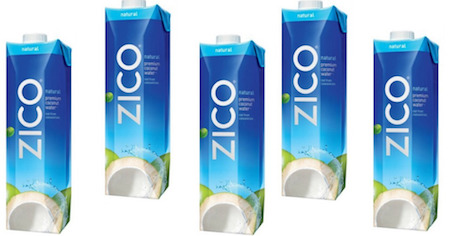
A little something tropical to sip on.
You're going to make it. Let us know your tips to kicking caffeine, and what your favorite alternatives are. If you need some support in letting go of caffeine, consider joining our free 7-Day Sleep Better Challenge, where you'll be armed with the tools to tackle your sleep issues and the coaching and community you need to stay consistent.
This article was fact checked for accuracy by Dr. Kim Langdon, MD. As always, this is not personal medical advice and we recommend that you talk with your doctor.
Share on Pinterest
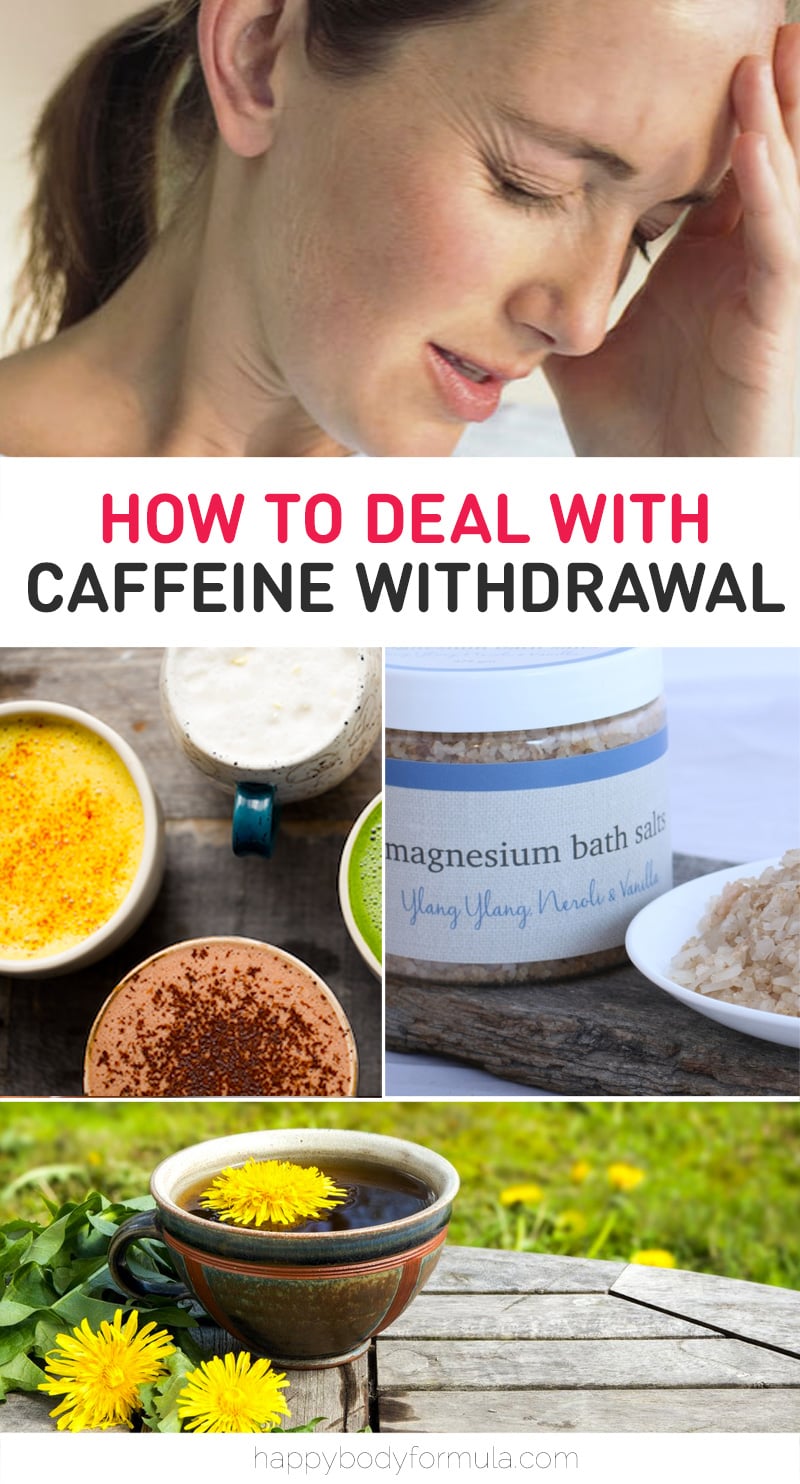
References
Kimberly Langdon M.D. is a retired University-trained obstetrician/gynecologist with 19-years of clinical experience. She delivered over 2000 babies to mothers in a suburban Midwestern community.

